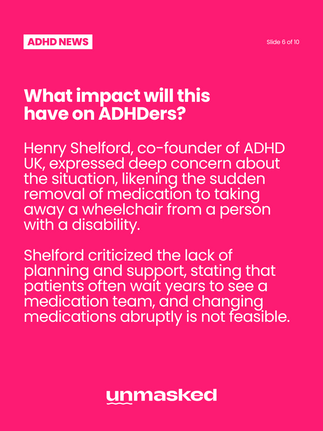Everything You Need To Know About The Medication Shortages Facing ADHDers Right Now
- Team Unmasked

- Oct 2, 2023
- 2 min read
Amidst a nationwide shortage of ADHD medications in England, doctors have been advised not to prescribe these drugs to new patients. This crisis has raised concerns among charities, highlighting the profound impact on individuals dealing with ADHD.

The Department of Health and Social Care issued a national patient safety alert attributing the medication shortages to a combination of manufacturing problems and a surge in global demand. These shortages are expected to persist until the end of the year.
ADHD, characterized by difficulties in concentration and impulsive behavior, affects approximately 2.2 million people in England, but experts believe it is both under-diagnosed and under-treated. Recent data from April to June 2023 indicates a substantial rise in ADHD prescriptions, with 202,000 individuals in England receiving them, compared to 103,000 during the same period in 2018-19.
In response to the shortage, healthcare providers have been instructed not to initiate new patients on medications affected by the supply issues. These include methylphenidate prolonged-release capsules and tablets, lisdexamfetamine capsules, and guanfacine prolonged-release tablets. While some other ADHD products remain available, they cannot meet the increased demand.
The Department of Health and Social Care's alert states that supply disruptions are anticipated to be resolved between October and December 2023. In the meantime, healthcare professionals are advised to identify patients currently prescribed these affected medications, assess their remaining supply, and seek guidance from dispensing pharmacy services or specialist teams if their stocks are running low.
Henry Shelford, CEO and co-founder of ADHD UK, expressed deep concern about the situation, likening the sudden removal of medication to taking away a wheelchair from a person with a disability. Shelford criticized the lack of planning and support, stating that patients often wait years to see a medication team, and changing medications abruptly is not feasible.
The shortage also presents a setback for individuals newly diagnosed with ADHD, as they face extended delays in receiving treatment. Shelford emphasized that people with ADHD feel let down by the NHS.
This is not the first time ADHD medication shortages have occurred in 2023. A previous warning by the DHSC highlighted a scarcity of atomoxetine capsules, with resolution expected next month.
Dr. Andrew Hill, a senior visiting research fellow at the University of Liverpool, pointed out that the issue stems from the NHS relying on just a few foreign suppliers for key medicines, leaving it vulnerable to shortages when these suppliers encounter problems. He called for a new approach, citing the European Union's efforts to safeguard critical medicine supplies.
A spokesperson for the Department of Health and Social Care acknowledged the supply issues, emphasising their collaboration with manufacturers to resolve the problems swiftly and ensure continuous access to ADHD medicines in the UK.




















Using technology to increase access to youth mental health support may offer a practical way for young people to reach guidance, safe-spaces, and early help without feeling overwhelmed by traditional systems. Digital platforms, helplines, and apps could give them a chance to seek support privately, connect with trained listeners-orexplore resources that might ease their emotional load. This gentle shift toward tech-based support may encourage youth to open-up at their own pace, especially when in-person help feels too heavy to approach.
There is always a chance that these tools-quietly make support feel closer than before, creating moments where help appears just a tap away. Even a small digital interaction might bring a sense of comfort. And somewhere in that space, you…
Detailed and practical, this guide explains concrete rebar in a way that feels approachable without oversimplifying. The step by step clarity is especially useful for readers new to the subject. I recently came across a construction related explanation on https://hurenberlin.com that offered a similar level of clarity, and this article fits right in with that quality. Great شيخ روحاني resource. explanation feels practical for everyday rauhane users. I checked recommended tools on https://www.eljnoub.com
s3udy
q8yat
elso9
When looking into PG courses after MBBS, I think the learning environment matters just as much as the specialization itself. Being in a place with strong educationvibes—access to libraries, academic discussions, and a focused peer group—can really influence how well you adapt to postgraduate studies. It’s something worth considering alongside entrance exams and course structure.
Command every gaze in olive meet the Buffalo Bills 2025 Salute To Service Hoodie.Wear your honour, support your team bold, respectful, unmistakable. At Arsenal Jackets, we fuse purpose and pride into one standout piece.
Are you having trouble with your biology assignments and wondering if you should pay someone to complete them on time? You don't need to search any farther! Selecting an online biology assignment help service entitles you to a dedicated team of researchers and subject-matter specialists who will produce an original paper that will get you a stellar mark. By selecting them, you can be sure that skilled professionals will modify your project assignments to satisfy the most exacting academic requirements. The expert staff is available to complete your science assignments with care so you may earn the desired A or B marks. They know how important it is to produce assignments on time and with constant excellence, so learners have confidence…